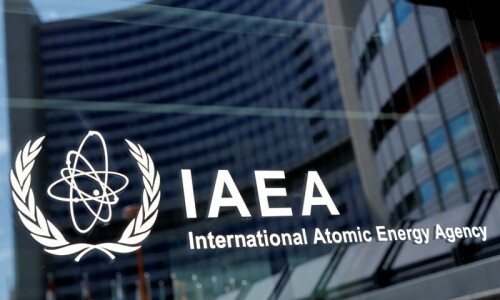TEHRAN: Iran could end its ban on acquiring nuclear weapons if Western sanctions are reimposed, its top diplomat told The Guardian in an interview published on Thursday ahead of talks on the matter.
Iran is set to meet with Britain, France and Germany for talks on its nuclear programme on Friday after the three governments joined with the United States to have Tehran censured by the UN atomic watchdog.
Last week’s chiding prompted a defiant response from Tehran, but its officials have since signalled willingness to engage with others ahead of the return of US president-elect Donald Trump, whose last administration pursued a policy of “maximum pressure” against the Islamic republic.
Iran insists on its right to nuclear energy for peaceful purposes, but according to UN’s International Atomic Energy Agency (IAEA), it is the only non-nuclear-weapon state enriching uranium to 60 per cent.
Meeting today with European nations for talks on N-programme
In an interview published on the eve of the talks, Foreign Minister Abbas Araghchi warned frustration in Tehran over unmet commitments, such as lifting sanctions, was fuelling debate on whether the country should alter its nuclear policy.
“We have no intention to go further than 60pc for the time being, and this is our determination right now,” he told Britain’s The Guardian newspaper. But, he added, “there is this debate going on in Iran, and mostly among the elites […] whether we should change our nuclear doctrine” as so far it has proven to be “insufficient in practice”.
Tehran has consistently denied any intention of pursuing atomic weapons.
Tehran’s willingness to sit down with the three European governments so soon after the censure comes just weeks before Trump is set to return to the White House.
‘Legal obligations’
Under the 2015 accord — which will expire in October 2025 — Iran’s enrichment was capped at 3.67pc.
Supreme leader Ayatollah Ali Khamenei, who has the final authority in Iran’s decision-making, has issued a religious decree, or fatwa, prohibiting atomic weapons. Iranian diplomat Majid Takht-Ravanchi, who serves as the political deputy to Araghchi, is scheduled to represent Iran in Friday’s talks.
He will meet beforehand with Enrique Mora, deputy secretary general of the European Union’s foreign affairs arm, according to the IRNA state news agency.
Last week, the 35-nation board of governors of the IAEA adopted a resolution condemning Iran for its lack of cooperation on nuclear issues. Iran described as “politically motivated” the resolution brought by Britain, France, Germany and the United States.
Published in Dawn, November 29th, 2024















































Dear visitor, the comments section is undergoing an overhaul and will return soon.